
America sin Nombre
Scope & Guideline
Exploring the Boundaries of Literary Thought
Introduction
Aims and Scopes
- Interdisciplinary Literary Analysis:
The journal emphasizes interdisciplinary approaches, integrating literary studies with cultural, historical, and sociological perspectives to deepen the understanding of Latin American literature. - Focus on Identity and Marginality:
A significant portion of the publications explores themes of identity, including gender, ethnicity, and socio-political contexts, particularly in relation to marginalized voices in literature. - Exploration of Contemporary Issues:
The journal addresses contemporary social issues through literature, such as violence, migration, and cultural hybridization, reflecting the realities of modern Latin America. - Historical Contextualization:
There is a consistent effort to contextualize contemporary literary works within historical narratives, allowing for a comprehensive understanding of the evolution of Latin American literature. - Translation and Transnationalism:
The journal promotes the study of translation and transnational connections in literature, highlighting the global nature of Latin American texts and their reception.
Trending and Emerging
- Digital and Cyber Literature:
Recent publications have increasingly focused on digital literature, including cyberpoetry and the impact of social media on literary forms, reflecting the growing importance of technology in contemporary literary practices. - Feminist and Gender Studies:
There is a significant rise in themes related to feminist critiques and gender studies, highlighting the contributions of women writers and exploring issues of gender identity and representation in literature. - Postcolonial and Decolonial Perspectives:
Emerging themes include postcolonial and decolonial analyses, which critically engage with the legacies of colonialism and seek to redefine cultural identities within a contemporary context. - Narratives of Violence and Trauma:
The exploration of violence and trauma in literature has gained traction, reflecting broader societal issues and the impact of historical events on individual and collective identities. - Ecocriticism and Environmental Literature:
An increasing focus on ecocriticism and literature that addresses environmental issues signifies a growing awareness of ecological concerns within the literary discourse.
Declining or Waning
- Traditional Canonical Literature:
There has been a noticeable decrease in publications focused on traditional canonical texts or authors, as the journal increasingly prioritizes contemporary voices and underrepresented narratives. - Eurocentric Perspectives:
The journal seems to be moving away from Eurocentric analyses of Latin American literature, focusing instead on indigenous and local perspectives that challenge colonial legacies. - Static Historical Narratives:
Themes centered around static or uncritical historical narratives are appearing less frequently, suggesting a shift towards more dynamic and critical engagements with history. - Nostalgic Literary Critique:
There is a waning interest in nostalgic critiques of past literary movements, with more emphasis on current and emerging literary forms and practices.
Similar Journals
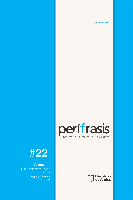
Perifrasis-Revista de Literatura Teoria y Critica
Exploring the intersections of literature and identity.Perifrasis-Revista de Literatura Teoria y Critica is a distinguished open-access journal published by UNIV ANDES in Colombia, dedicated to advancing the fields of literature, literary theory, and criticism. With an ISSN of 2145-8987 and an E-ISSN of 2145-9045, this journal has been a significant platform for scholarly discourse since its inception in 2010, embracing an open-access model that enhances accessibility and dissemination of research findings. Strategically positioned in the Q2 category for Literature and Literary Theory, Perifrasis boasts a commendable Scopus ranking, reflecting its commitment to high-quality scholarship. The journal encompasses a wide range of topics within the humanities, including cultural studies and gender studies, and aims to foster critical engagement and innovative thinking among researchers, students, and professionals alike. As the journal continues to evolve through its converged years from 2019 to 2024, it remains a vital resource for those exploring the dynamic intersections of literature, society, and identity.

CHASQUI-REVISTA DE LITERATURA LATINOAMERICANA
Advancing Scholarship in Latin American Literature and CultureCHASQUI-REVISTA DE LITERATURA LATINOAMERICANA is an esteemed academic journal published by Arizona State University, dedicated to the exploration and dissemination of research in the fields of Literature and Literary Theory and Cultural Studies. With an ISSN of 0145-8973 and an E-ISSN of 2327-4247, the journal serves as a critical platform for scholars examining the complexities of Latin American literature from diverse perspectives. Notably ranked in the second quartile in its field as of 2023, CHASQUI reflects its commitment to quality and impactful scholarship. The journal operates within a two-year converged publication cycle, ensuring it remains at the forefront of contemporary discussions and innovations in its disciplines. Although there are no open access options, researchers and students alike will find valuable insights within its pages, bolstered by a robust academic community. Through its dedication to fostering literary scholarship, CHASQUI plays an integral role in advancing the understanding of Latin American narratives and cultural expressions.

MELUS
Fostering Transformative Ideas in American LiteratureMELUS (Modern English Language and Literature Studies), published by Oxford University Press Inc, is a leading academic journal dedicated to exploring the complexities and dynamics of American literature and culture from various critical perspectives. With a strong historical foundation since its inception in 1974, MELUS is recognized for its contributions to both Cultural Studies and Literature and Literary Theory, achieving notable rankings in the Q2 and Q3 quartiles respectively as of 2023. The journal's articles are essential for scholars and practitioners seeking to engage with contemporary literary discourse, featuring innovative research that challenges conventional understandings of cultural identity and representation. Although it does not offer Open Access options, MELUS remains a crucial resource for academic libraries and research institutions in the United States and beyond, providing access to cutting-edge scholarship that informs the study of literature in a global context. For those invested in the field, MELUS serves as an invaluable platform for disseminating transformative ideas and fostering discussions that shape the future of literary studies.
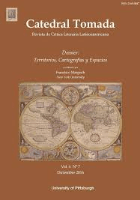
Catedral Tomada-Revista de Critica Literaria Latinoamericana-Journal of Latin American Literary Criticism
Fostering Dialogue in Latin American Literary DiscourseCatedral Tomada - Revista de Crítica Literaria Latinoamericana is a pioneering journal dedicated to the exploration and critique of Latin American literature and its broader cultural implications. Published by the University of Pittsburgh's Library System, this Open Access journal has been instrumental since its launch in 2013 in making scholarly discussions accessible to a wider audience. With an ISSN of 2169-0847, the journal serves as a vital platform for researchers, professionals, and students interested in Literature and Literary Theory, Cultural Studies, and Linguistics and Language. Its esteemed ranking places it in Quartile 1 for Literature and Literary Theory and Quartile 2 for the other categories, underlining its commitment to high-quality academic discourse. Converging insights through a quarterly publication schedule from 2019 to 2024, Catedral Tomada aims to foster a rich dialogue on Latin American literary criticism, encouraging innovative perspectives and diverse voices within the field.
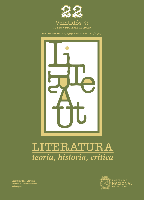
Literatura-Teoria Historia Critica
Catalyzing Critical Thought in Literary TheoryLiteratura-Teoria Historia Critica is a distinguished open-access journal published by UNIV NAC COLOMBIA, FAC CIENCIAS HUMANAS, that has been at the forefront of literary scholarship since its inception in 2004. With an ISSN of 0123-5931 and E-ISSN of 2256-5450, it provides an invaluable platform for researchers, professionals, and students in the field of Literature and Literary Theory. The journal's significance is underscored by its remarkable placement in the Q1 category within its field in the year 2023, as well as its Scopus ranking of #556 out of 1106 in Arts and Humanities, highlighting its influence and reach. The journal aims to foster academic discourse by publishing high-quality research articles that scrutinize literary texts, theories, and histories, facilitating a deeper understanding of literature's role in society. With a commitment to accessibility and scholarly rigor, Literatura-Teoria Historia Critica is an essential resource for those seeking to enrich their knowledge and engage with contemporary literary debates.
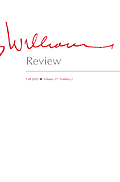
WILLIAM CARLOS WILLIAMS REVIEW
Bridging the past and present of American literature.WILLIAM CARLOS WILLIAMS REVIEW, published by Penn State University Press, is a distinguished academic journal dedicated to the exploration of the life and works of the influential American poet and physician, William Carlos Williams, as well as broader themes in modernist literature. With its ISSN 0196-6286 and E-ISSN 1935-0244, the journal provides a platform for critical essays, scholarly analyses, and innovative research that contribute to the understanding of Williams's contributions to the literary canon and their relevance in contemporary literary studies. Although it is not an Open Access journal, its rigorous editorial standards and commitment to high-quality scholarship make it a valuable resource for researchers, educators, and students in the fields of English literature and cultural studies. By publishing engaging discourse that bridges historical context and modern interpretation, the WILLIAM CARLOS WILLIAMS REVIEW stands out as an essential journal for those interested in the intersections of poetry, medicine, and society.

Iberoamericana
Innovating Understanding of Iberian Heritage and HistoryIberoamericana, an esteemed open-access journal published by VERVUERT VERLAG since 2001, stands at the forefront of interdisciplinary research encompassing Anthropology, Cultural Studies, History, and Literature and Literary Theory. Housed in Spain with an operational address in Germany, this journal serves as a vital platform for the dissemination of scholarly work, particularly relevant to the Iberian context and its global connections. With impressive rankings, including Q3 in History and Q3 in Literature and Literary Theory, Iberoamericana promotes academic conversations that enhance understanding of cultural dynamics. The journal's commitment to open access ensures that research is accessible to a global audience, fostering collaboration and innovation. Researchers, professionals, and students are encouraged to engage with this essential resource that not only contributes to their respective fields but also broadens the appreciation of the rich, diverse cultural heritage of the Iberian Peninsula.

Studia Universitatis Babes-Bolyai Philologia
Unlocking Knowledge: Open Access to Philological ExcellenceWelcome to Studia Universitatis Babes-Bolyai Philologia, a distinguished journal published by UNIV BABES-BOLYAI, which has proudly embraced Open Access since 2021. With an ISSN of 1220-0484 and an E-ISSN of 2065-9652, this journal serves as a vital platform for scholars in the field of philology, offering a rich repository of contemporary research and innovative thought. Hailing from the vibrant academic community of Cluj-Napoca, Romania, the journal aims to foster interdisciplinary dialogue and promote cutting-edge studies that explore linguistic, literary, and cultural dynamics across the globe. By providing unrestricted access to its content, Studia Universitatis Babes-Bolyai Philologia ensures that vital research is available to a worldwide audience, empowering researchers, professionals, and students to engage with and contribute to the ever-evolving discourse in philological studies.
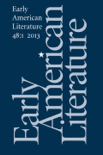
EARLY AMERICAN LITERATURE
Connecting Past Narratives with Contemporary UnderstandingEARLY AMERICAN LITERATURE, published by the University of North Carolina Press, stands as a pivotal journal in the field of American literary studies. With an ISSN of 0012-8163 and E-ISSN of 1534-147X, this journal invites scholarly discourse and analysis of literary works from the early American period, effectively bridging historical context and contemporary literary theory. The journal has maintained a consistent publication history since 1973, with significant converged years, providing essential insights for researchers and students alike. Ranked Q3 in Literature and Literary Theory with an impressive Scopus rank placing it in the 66th percentile, EARLY AMERICAN LITERATURE remains an essential resource for exploring the intricacies of early American texts and their implications. Although not an open-access journal, its contributions are invaluable for anyone engaging with this rich literary tradition, fostering a deeper understanding of America's cultural and literary heritage.
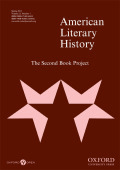
AMERICAN LITERARY HISTORY
Navigating the Rich Landscape of American Literary StudiesAMERICAN LITERARY HISTORY, published by Oxford University Press Inc, is a leading peer-reviewed journal dedicated to advancing the understanding of American literature within the broader contexts of cultural studies and history. With an impressive impact factor reflecting its Q1 ranking in Cultural Studies, History, and Literature and Literary Theory, this journal serves as an essential resource for researchers, professionals, and students alike. Covering a wide range of topics, it seeks to illuminate the historical and cultural dynamics that shape literary production in the United States from 1989 to 2024. Although not an open access journal, AMERICAN LITERARY HISTORY remains a pivotal platform for scholarly discourse, encouraging rigorous scholarship and critical engagement with literary texts. The journal's strong Scopus rankings further emphasize its significance, ranked among the top journals in its field, making it an indispensable tool for anyone seeking to explore the rich tapestry of American literary heritage.